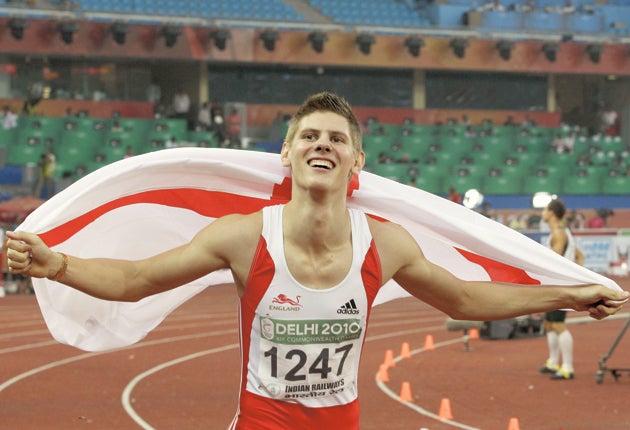High hurdler with friends in high places
Delhi medallist Lawrence Clarke is heir to a baronetcy and will one day be a Sir. He doffs his cap to Simon Turnbull.

Lawrence Clarke is sitting in the foyer of the Ambassador Hotel in Delhi, watching a succession of English gold-medal winners file past for a final-day celebration at the Team England Lodge. Clarke himself has been a medal winner at the XIX Commonwealth Games, although he has not brought with him the bronze he claimed in a famous English 1-2-3 in the 110m hurdles final.
Given his background, as the heir to a baronetcy, it is only natural to wonder whether the richly talented20-year-old is aware of the titled figure who won the first high hurdles final at the inaugural Commonwealth Games in Hamilton, Canada, in 1930. That was Lord Burghley, the 6th Marquess of Exeter, the aristocratic athlete portrayed by Nigel Havers in Chariots of Fire.
"I'm very aware of David Burghley," Clarke says. "He was a very close friend of my grandfather. They went to Eton together. He was from a much grander background, but because he did the hurdles and because he went to my school that sort of connection is something I canrelate to as an inspiration.
"He didn't do athletics at Eton. He didn't take it up until he went to Cambridge. I took it up quite late – in 2006, going into 2007 – so he was an inspiration to me then. I thought, 'Well, I haven't done anything at school, but maybe one day I could be like him'. I've got a pair of running spikes that have got his name on the back."
Like Lord Burghley, Clarke wants to make a name for himself in his own right: as a winner of titles rather than as an inheritor of one. He is the son of Sir Toby Clarke – and the nephew of Jacob Rees-Mogg, the Conservative MP for North Somerset.
"It's a hereditary baronetcy," he says. "My father's a Sir. My grandfather was a Sir. My great-grandfather was a Sir. And I will one day be a Sir. I don't think people now really care about titles. So many people get knighted for doing good and great things and I'd like to be knighted in that field rather than the archaic one."
Last year at Novi Sad in Serbia, Clarke won the European junior 110m hurdles title, which was one honour that eluded Colin Jackson in his careeras a world record-breaking high hurdler. He won silver behind Jon Ridgeon in 1985.
In Delhi, Clarke won the first of what will surely be a string of major championship medals at senior level. Remarkably, he did so – taking bronze behind his England team-mates Andy Turner and William Sharman – despite tearing his hip flexor muscle in the heats. When it came to the final, later the same day, he was advised not to run but chose to go for broke, settling into his starting blocks without having risked a warm-up.
He is a rare talent, and a relative novice still. It was only after making the England team for the Commonwealth Youth Games in Pune, India, in 2008 that Clarke started to follow a structured training regime. "When I first joined Malcolm Arnold's group I couldn't do five press-ups," he confesses. "I was the weakest person you could ever come across."
Two years into his development as part of the group guided by Arnold at Bath University, the weakling is steadily gathering strength as an emerging force in high hurdles. He could not be in better hands. Arnold was the coach behind Jackson's successes and his stable at Bath includes Dai Greene and Rhys Williams, the Welsh duo who were first and third in the 400m hurdles final in Delhi.
Greene was also following in the footsteps of Lord Burghley, who won both hurdles titles at those inaugural Commonwealth Games. Unlike Clarke, though, he has never seen Chariots of Fire – in which the Burghley character is depicted practising his hurdles technique by clearing barriers that have filled glasses of champagne balanced on top.
In fact, David Burghley had matchboxes positioned on top of his hurdles. He was so unimpressed with the liberties taken in the script that he refused to grant permission for his name to be used in the film. Hence the titled 1924 Olympic team-mate of Eric Liddell and Harold Abrahams appeared on the big screen as Lord Andrew Lindsay.
"I am aware of all the inaccuracies," Clarke says, "but it's a great film. It would be quite amusing to get a photo of me hurdling over champagne glasses. I was actually approached by the owner of a hotel to do it in front of his hotel, but I thought, 'I haven't done anything yet. It'll probably send out the wrong image.' I want to be known for what I achieve, like David Burghley was when he was at the top of his game."
Join our commenting forum
Join thought-provoking conversations, follow other Independent readers and see their replies
Comments
Bookmark popover
Removed from bookmarks